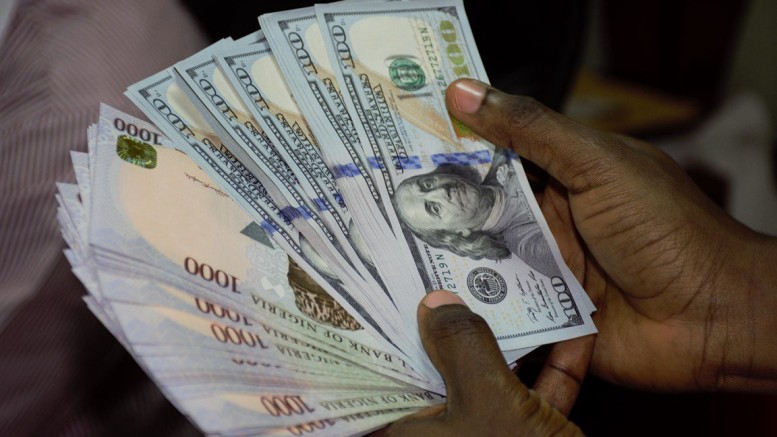Economy
Naira Appreciates After DSS And EFCC Raid Traders
The Nigerian Naira gained against the U.S dollar on Friday in all segments of the foreign exchange market.
The Naira improved N5 at the parallel market to exchange at N455, from the N460 recorded on Thursday, while both the Pound Sterling and the Euro were exchanged at N555 and N505, respectively.
On the interbank market, the Naira climbed N1.45 to close at N304.75 from N306.50 recorded on Thursday.
While, the local currency remains N385 to a dollar at the Bureau De Change Segment — in line with the CBN directive. Both the pound and the Euro were exchanged at N555 and N500, respectively.
But Bureau de change operators said activities at the segment were low as Thursday’s raid by the Department of State Service and Economic and Financial Crimes Commission on market traders has weakened business sentiment.
Some experts have said the raid was a temporary measure, and not the solution to the illiquidity of the foreign exchange market.
“Until, the Central Bank of Nigeria increase its foreign exchange earnings, usually through diversification or on a short-term basis surge in global oil prices, which is currently tied to OPEC decision, the liquidity issue will persist,” said Samed Olukoya, a foreign exchange research analyst at Investors King Ltd.
However, in an effort to improve the Naira value, the CBN has licensed additional 21 international money transfer operators to augment current market liquidity. But on Friday, the apex bank alerted the public to the resurgence of illegal money transfer operators in the country.
In a statement signed by the Acting Director of Corporate Communications Department, Isaac Okorafor, the CBN explained that “this unscrupulous operators, lure unsuspecting customers with ridiculous exchange rate and use Naira accounts opened in local banks ostensibly for legal business to pay out the proceeds to the beneficiaries, while channeling the foreign currencies to fund the parallel market.”
He further stated that “This practice has led to non-reporting of such transactions to relevant authorities thereby undermining effective surveillance of the sector as well as leading to discrepancies in statistics on the transactions between countries of origin of remittance and the destination country, Nigeria.
Follow us on social media:-

 Celebrity Gossip & Gist2 days ago
Celebrity Gossip & Gist2 days ago“The money wey dem pay me don expire” – Moment Burna Boy stops his performance at the Oando PLC end of the year party (Video)
-

 Economy2 days ago
Economy2 days agoGoods worth millions of naira destroyed as fire guts spare parts market in Ibadan
-

 Celebrity Gossip & Gist18 hours ago
Celebrity Gossip & Gist18 hours agoMoment stage collapses on Odumodublvck during concert performance (Video)
-

 Economy17 hours ago
Economy17 hours agoPresident Tinubu cancels Lagos engagements in honor of food stampede victims





